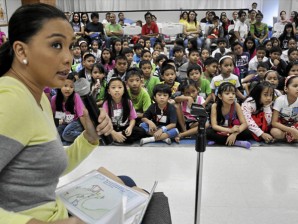Spanking is no way to discipline a kid, Inquirer Read-Along teaches

TV Host Cheryl Cosim read a book during Read Along session at Inquirer office in Makati City. ARNOLD ALMACEN/INQUIRER
There are positive ways to discipline a child.
This was the focus of Saturday’s Inquirer Read-Along, which stressed the need to eliminate spanking and other forms of violence against children.
The session, attended by around 100 children, was held in time for Junior Inquirer’s 16th anniversary and in cooperation with the nongovernment organization Plan International Philippines. It featured television news personality Cheryl Cosim and returning storyteller Ann Abacan, principal of Sophia School in Meycauayan, Bulacan.
Cosim read the “Story of Mimi,” a story of a young goat that was scared to come home because of her fear of being spanked by her father. The story, written by Lydia Juadiong, was developed for the “Strengthening Civil Society in Eliminating Violence against Children in the Philippines” project of Plan International and the European Union.
Cosim encouraged the children to voice their reactions to the story through a series of questions. With some of the children saying that physical punishment hurt them, she ended the session with advice for the parents present at the session: “We should protect children from harm and not cause it. Communication is important. Talk to your children.”
Article continues after this advertisementGood way to communicate
Article continues after this advertisement
A child protection ambassador for Plan International Philippines, Cosim said that she was “thankful to the Inquirer Read-Along for promoting [our] advocacy”.
“The Read-Along is a good way to communicate to the children and also to tell parents that corporal punishment may have a bigger possibility of destroying the child. Together, we may be able to educate people about children’s rights and show people that there are better options than physical punishment,” Cosim said.
Abacan read “Papel de Liha” by Ompong Remigio, a story about a girl’s fascination with her mother’s hands, which are soft and tender although roughened by hard work. Abacan was assisted by Junior Inquirer snoops-in-training. The snoops are the children correspondents of Junior Inquirer.
Eight-year-old Francis Miguel Gregorio first read about the session in an issue of Junior Inquirer. “He was the one who kept asking that we come here, and he didn’t stop talking about it,” said Gregorio’s mother, Teenie. Gregorio, his mother and his younger brother Paulo trooped to the Inquirer office all the way from Laguna.
Child-parent relationship
“I liked all of the storytellers. They were very good readers,” said Gregorio.
Ten-year-old Irish Montemayor of 15th Avenue Elementary School said she liked the “Story of Mimi” because it made her remember her own experiences whenever her parents tried to discipline her.
“From the story, I learned that parents could discipline their children better by talking to them first rather than spanking them,” she said.
Apologize to parents
She added that the stories made her realize that she should also apologize to her parents for the wrong things she had done.
Edna Cruzada, mother to an 8-year-old boy, said she liked the stories because they showed the common relationship between parents and their children. “It showed that while most parents spank their kids for a reason, it should really be avoided,” she said in Filipino.
“It is true that spanking your children is not necessary but sometimes it is unavoidable,” Ruby Medrano said in Filipino. But after the Read-Along she said she would think of alternative disciplinary action for her seven-year-old daughter. “For example, if she refuses to study, I will deprive her of watching television.”
Explain why
Monette Olaso said she hoped the children who attended the read-along would understand why they were being spanked or scolded. She shared that she rarely spanked her daughters, who are aged nine and three. “In my experience, talking to my daughters is more effective than hurting them,” she said in Filipino. “If you explain to them what they did wrong, they listen more; while if you hurt them, they only feel hatred towards you and learn to talk back,” she said.
Junior Inquirer was hailed by Unicef and the Philippine Press Institute as Best Children’s Newspaper for five straight years until its induction into the Hall of Fame in 2005.
Plan International Philippines is one of the 66 country offices of Plan International, a humanitarian, child-centered development organization.
Saturday’s session was hosted by Junior Inquirer editor in chief Ruth Navarra.
Prizes courtesy of Vibal Publishing House were given to the children during the question and answer portion. Plan International Philippines also gave snacks to the kids after the session. Inquirer Research